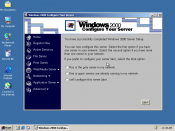Introduction2
Characteristics3
Multitasking3
Application Sharing4
Print Sharing4
System failure recovery4
File Sharing/Locking5
Comparison of Operating Systems6
Role of Network Administrator8
User access8
Security Measures9
Network Performance9
New Purchase Recommendations/ Budget10
Maintenance10
Bibliography11
Introduction
Operating systems are the very basis of computer software programs. They exist in order for users to interact with the computer's hardware. An example would be MS- DOS. DOS however is a single user operating system which can only support input from one user at a time. So if more than one person needs to use a computer's resources or if people want to share files, a different operating system is needed. Hence network and multi user operating systems.
Network operating systems such as Windows 2000 Server and Novell Netware allow several people to be connected to each others computer simultaneously for the sharing of files.
Multi user operating systems allow many users to share the resources of a processor at the same, for example UNIX, LINUX, or CICS.
The main difference between the two operating systems is that networked systems all have their own CPU and memory, whereas multi user systems have one central processor and several dumb terminals.
This essay describes and compares all the differences between the two operating systems.
Since multi user systems share resources, such as the CPU, memory, storage and input/ output devices, as well as software applications and files, the operating system has to organise and control the access to these resources (called scheduling), the most common way of doing this being the Round Robin strategy where each process has a short but equal time slice. For this reason, multi user operating systems require a great deal of memory in order to work effectively.
Characteristics
Multitasking
A main feature of multi user (and, to an extent, networked) systems is multi...



Informative
If anyone needs to brush up on their info about computer this is the essay to read. Good contruction and information.
1 out of 1 people found this comment useful.